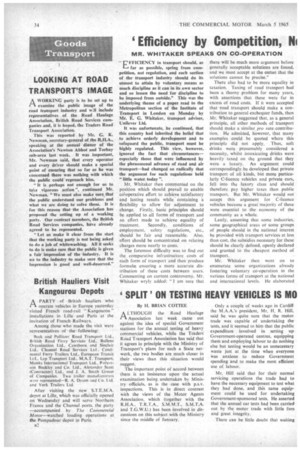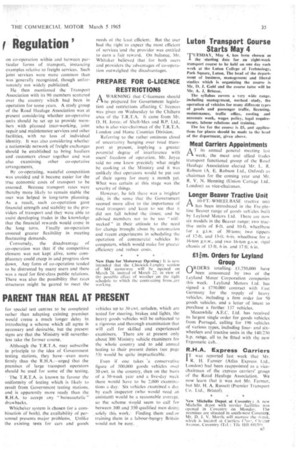'Efficiency by Competition,
Page 36

Page 37

If you've noticed an error in this article please click here to report it so we can fix it.
f Regulation MR. WHITAKER SPEAKS ON CO-OPERATION
FFICIENCY transport should, as
I—I far as possible, spring from competition, not regulation, and each section of the transport industry should do its utmost to attain by voluntary means as much discipline as it can in its own sector and so lessen the need for discipline to be imposed from outside." This was the underlying theme of a paper read to the Metropolitan section of the Institute of Transport in London on Monday by Mr. E. G. Whitaker, transport adviser, Unilever Ltd.
It was unfortunate, he continued, that this country had inherited the belief that to achieve orderly development and to safeguard the public, transport must be highly regulated. This view, however, ignored the fact that circumstances— especially those that were influenced by the phenomenal advance of road and air transport—had changed so radically that the argument for such regulations held " little water today ".
Mr. Whitaker then commented on the position which should prevail to enable cooperative effort to achieve satisfactory and lasting results while' containing a flexibility to allow for adjustment to change. Firstly, basic principles should be applied to all forms of transport and an effort made to achieve equality of treatment. Secondly, conditions of employment, safety regulations, etc., should be fair and reasonable. Also, effort should be concentrated on relating charges more nearly to costs.
The foremost difficulty was to find out the comparative infrastructure costs of each form of transport and then produce formuke ensuring a more accurate distribution of these costs between users. Commenting on current controversy, Mr. Whitaker wryly added: " I am sure that
there will be much more argument before generally acceptable solutions are found, and we must accept at the outset that the solutions cannot be precise."
There also had to be more -equality in taxation. Taxing of road transport had been a thorny problem for many years, with assertions that these were far in excess of road costs. If it were accepted that road transport should make a contribution to general exchequer funds, then Mr. Whitaker suggested that, as a general principle, all other methods of transport should make a similar. pro rata. contribution. He admitted, however, that many examples could be quoted where this principle did not apply. Thus, soft drinks were presumably considered a necessity, whilst intoxicating drinks were heavily taxed on the ground that they were a luxury. An argument could correspondingly be developed that private transport of all kinds, but more particularly C-licence vehicles and private cars, fell into the luxury class and should therefore pay higher taxes than public transport. But Mr.. Whitaker would not accept this argument for C-licence vehicles because a great majority of these were essential to the economy of the community as a whole.
Lastly, assuming that some industries, some geographical areas or some groups of people should in the national interest be provided with transport services at less than cost, the subsidies necessary for these should be clearly defined, openly declared and granted to the cheapest method of transport.
Mr. Whitaker then went on to enumerate some organizations already fostering voluntary co-operation in the various forms of transport at the national and international levels. He elaborated
on co-operation within and between, particular forms of transport, instancing exarnples relative to freight Services. Such joint services were more common than was -generally recognized, though unfortunately not widely publicized.
He then mentioned the Transport AssOciation with its 90 members scattered over the country which had been in operation for some years. A study group of the Road Haulage Association was at present considering whether co-operative units should be set up to provide members with planned inter-working, joint repair and maintenance services and other facilities, with no loss of individual identity. It was also considering whether a nationwide network of freight exchanges should be established to bring hauliers and customers closer together and was also examining other co-operative arrangements.
• By co-operating, wasteful competition Was avoided and it became easier for the true ecOnomie costs of transport to be assessed. Because transport rates were thereby more likely to remain stable the user was helped in long-term planning: As a result, such co-operation gave financial strength and stability to the providers of transport and they were able to assist developing trades in the knowledge that the financial rewards would come in the long term, Finally co-operation ensured greater flexibility in meeting fluctuating demands.
Conversely, the disadvantage of co-operation was that if the competitive element was not kept alive, some -comPlacency could creep in and progress slow down. Any form of co-operation tended to be distrusted by many lasers and there i.vas a need for first-class public relations. There was also the possibility that rates structures might be geared to meet the needs of the least efficient, But the user had the right to expect the Most efficient of services 'and the provider was entitled to earn a fair reward.. On balance, Mr. Whitaker believed that for both users and providers the advantages of co-operation outweighed the disadvantages.




























































































































































